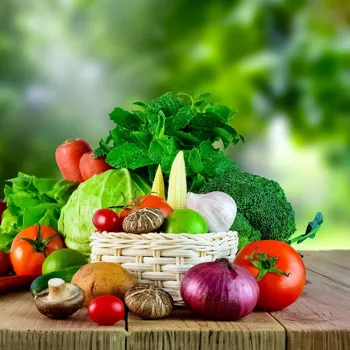Unlock the secrets of Indian seasonal foods for a healthier you! Dive into the guide and feel the difference
Namaste, readers! It’s no secret that India is a land of diversity, and that extends to our food
as well. From the snow-capped Himalayas to the sunny beaches of the South, each region boasts unique flavors and ingredients that change with the seasons.
But have you ever stopped to think about how these seasonal changes can actually boost your health and well-being? Eating seasonal is not just a passing food fad; it is a time-tested practice that connects us to the rhythms of nature and unlocks optimal nutrition.
In this article, we'll explore the incredible benefits of incorporating seasonal foods into your daily diet, keeping in mind our Indian context and culinary traditions.
Think about it
Mother Nature is pretty smart. She provides us with exactly what our bodies need at the right time. During the hot summer months, we are blessed with juicy mangoes, cooling cucumbers, and hydrating watermelons.
These fruits and vegetables are high in water content and electrolytes, which help us stay hydrated and beat the intense heat.
Winter brings forth root vegetables like carrots and sweet potatoes, as well as leafy greens like spinach and mustard leaves, packed with immune-boosting vitamins and minerals to combat the cold and flu season.
This natural harmony is not just a coincidence; it's a carefully orchestrated system designed to keep us healthy and thriving. Seasonal food is fresher, tastier and full of more nutrients than vegetables that are grown indoors or shipped globally.
Stay hydrated with summer fruits and veggies rich in vitamins and antioxidants
As the scorching summer sun blazes down, it's crucial to stay hydrated and protect our bodies from the heat. Lucky for us, summer is the season of refreshing fruits and vegetables that are perfect for the job.

Mangoes, the king of fruits, are not only delicious but also rich in vitamins A and C, which are essential for maintaining healthy skin and boosting immunity.
Watermelons, with their high water content, are incredibly hydrating and a good source of lycopene, an antioxidant that protects against sun damage. Cucumbers are another summer staple, known for their cooling properties and high water content. They are also a good source of vitamins K and C.
Other seasonal heroes include melons, such as muskmelon and cantaloupe, citrus fruits like oranges and lemons, and leafy greens like spinach, each offering unique health benefits to help you stay cool, hydrated, and energized throughout the summer months.
Monsoon foods boost immunity with gourds, spices for health
The monsoon season brings welcome relief from the summer heat, and it’s a time when earthy flavors and immunity-boosting foods take center stage. As the humidity rises and the risk of infections increases, it's important to focus on foods that strengthen our immune system.

Bitter gourd, despite its name, is a nutritional powerhouse that helps regulate blood sugar levels and is rich in antioxidants. Bottle gourd, light and easily digestible, is excellent for promoting gut health. Corn on the cob, a monsoon favorite, provides dietary fiber and antioxidants.
The monsoon is also the time for many types of gourds like the snake gourd, ridge gourd and pointed gourd which can make some delicious and nutritous dishes. Eating these foods can boost immunity.
These seasonal vegetables, combined with spices like ginger, garlic and turmeric, can create delicious and healthy meals that nourish the body and protect against monsoon-related illnesses.
Winter vegetables and spices boost immunity, warmth
As the temperature drops, our bodies need extra warmth and energy to combat the cold. Winter is the season for root vegetables, leafy greens, and warming spices that provide these vital nutrients. Carrots, rich in beta-carotene, are excellent for vision and immunity.
Sweet potatoes provide sustained energy and are a good source of vitamins A and C. Spinach and mustard greens are packed with vitamins, minerals, and antioxidants that boost immunity and protect against winter ailments.
Other winter favorites include cauliflower, brussel sprouts, fenugreek leaves, radishes, and green peas.
These vegetables can be used in soups, stews, and stir-fries, seasoned with warming spices like ginger, garlic, and turmeric, to create comforting and nourishing meals that keep you warm and healthy throughout the winter months.
Don't for get to include some warm seasonal fruits and dry fruits as well.
Spring diet renewal with fresh, nutrient-rich foods for vitality
Spring is a time for renewal and rejuvenation, and our diet should reflect this. As new life blossoms around us, it's the perfect time to incorporate fresh, light, and nutrient-rich foods into our meals.
Leafy greens like lettuce and spring onions are abundant and provide essential vitamins and minerals. Radishes add a crisp, peppery flavor to salads and are a good source of vitamin C. Strawberries, with their vibrant color and sweet taste, are rich in antioxidants.
Other spring favorites include asparagus, artichokes, and fresh herbs like mint, coriander, and dill. These foods can be used in salads, smoothies, and light meals that cleanse the body and revitalize our energy levels.
Spring also brings the opportunity to transition from the heavier foods of winter to lighter, fresher options, paving the way for a healthy and vibrant summer.
To eat seasonally, visit farmers' markets, consult elders, and consider local climate
So, how do you make the switch to eating seasonally? The best place to start is your local farmers' market or vegetable vendor. These markets are a treasure trove of fresh, seasonal produce, allowing you to connect directly with the farmers who grow your food.
Pay attention to what's prominently displayed and in abundance – that's a good indication of what's in season. Don't hesitate to ask the vendors about their produce and how they like to prepare it. Another great resource is your elders.
Grandmothers and older family members often have a wealth of knowledge about seasonal foods and traditional recipes. Embrace their wisdom and learn how to incorporate seasonal ingredients into your cooking. Finally, be mindful of your local climate and growing conditions.
Understanding what grows well in your region during each season will help you make informed choices and enjoy the freshest, most nutritious foods available. There are some online sites as well that have seasonal guide.
Growing seasonal vegetables promotes health and sustainability
You can also consider growing your own vegetables that are in season to consume them. This will encourage a healthy lifestyle as well as provide organic food.

Eating seasonally connects us to nature's power and boosts health
Eating seasonally is more than just a dietary choice; it's a way of life. By aligning our diets with the natural rhythms of the seasons, we can tap into the incredible power of nature to nourish our bodies, boost our health, and connect with our cultural heritage.
From the cooling fruits of summer to the warming vegetables of winter, each season brings unique flavors and nutrients that can enhance our well-being. So, embrace the seasonality, explore your local markets and vendors, and discover the delicious and nutritious bounty that India has to offer.
Your body will thank you for it!
AI Generated Content. Glance/InMobi shall have no liability for the content


















